When is the next Google update in 2025? This is not just a question but a common concern of millions of website administrators, SEO experts, and global businesses. Every time Google updates its algorithm, the entire search ranking landscape can change in the blink of an eye.
So, when will the next update take place, what’s new, and what do you need to prepare to not be left behind? Let’s explore it all in the article below.. Optimize your site now!

Key Takeaways
|
Overview of Major Google Algorithm Updates
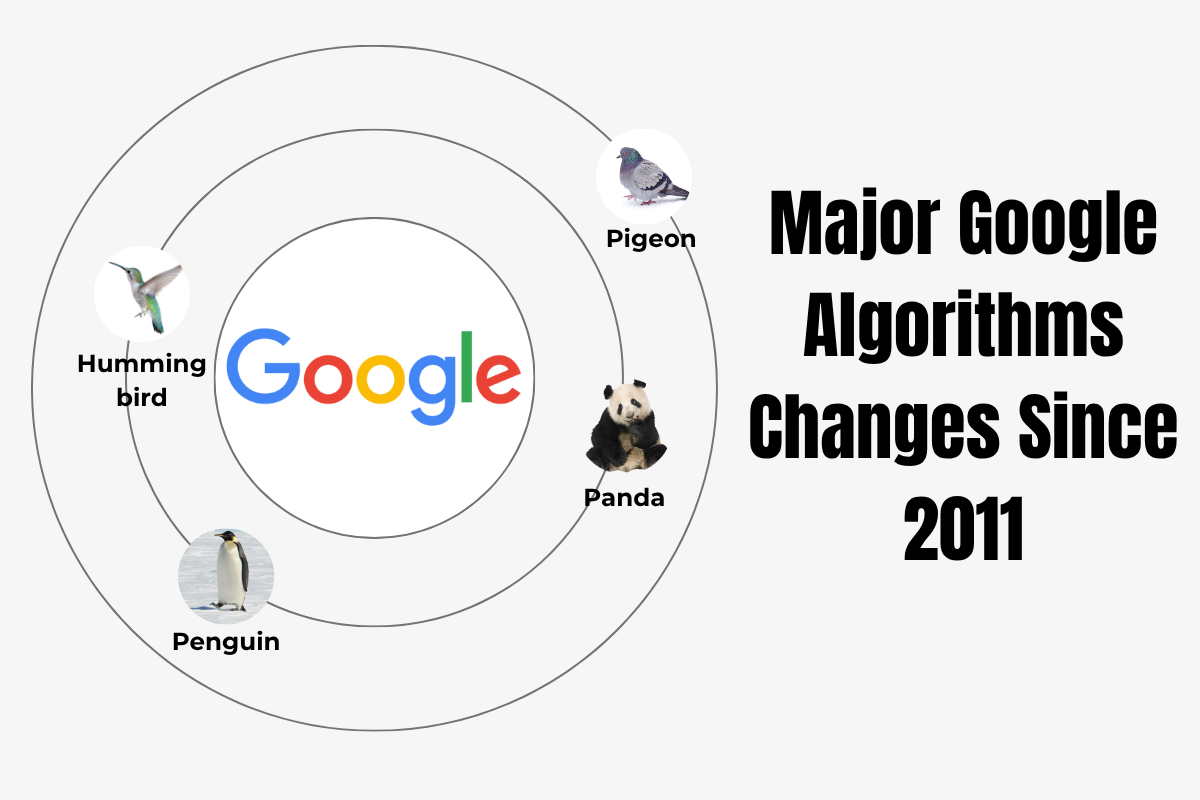
A brief historry of major Google algorithm changes
Google algorithm updates are periodic changes that Google makes to its search ranking system. Their main purpose is to improve the quality of search results, ensuring that users receive the most accurate and relevant information. These changes can range from small to large, affecting how content is evaluated.
For SEO, these updates are extremely important because they directly affect a website’s rankings, visibility, and traffic. An update can either move a website to the top or cause it to lose its position. This requires SEO professionals to constantly adjust their strategies. Failure to adapt can result in a significant drop in search performance.
In 2025, tracking Google algorithm updates becomes more important as Google grows smarter and more complex. With advances in AI and machine learning, algorithms evaluate content and user behavior more effectively. Understanding these changes helps businesses stay competitive and optimize better.
Google makes over 3,200 algorithm changes annually, averaging nine per day (ROI Revolution). Most are minor, but core updates occur 3–4 times a year. In 2024, Google released four core updates and three spam updates. This pattern suggests multiple major updates in 2025, with core updates likely every 3–5 months.
Google Updates in 2025: What’s Happened So Far
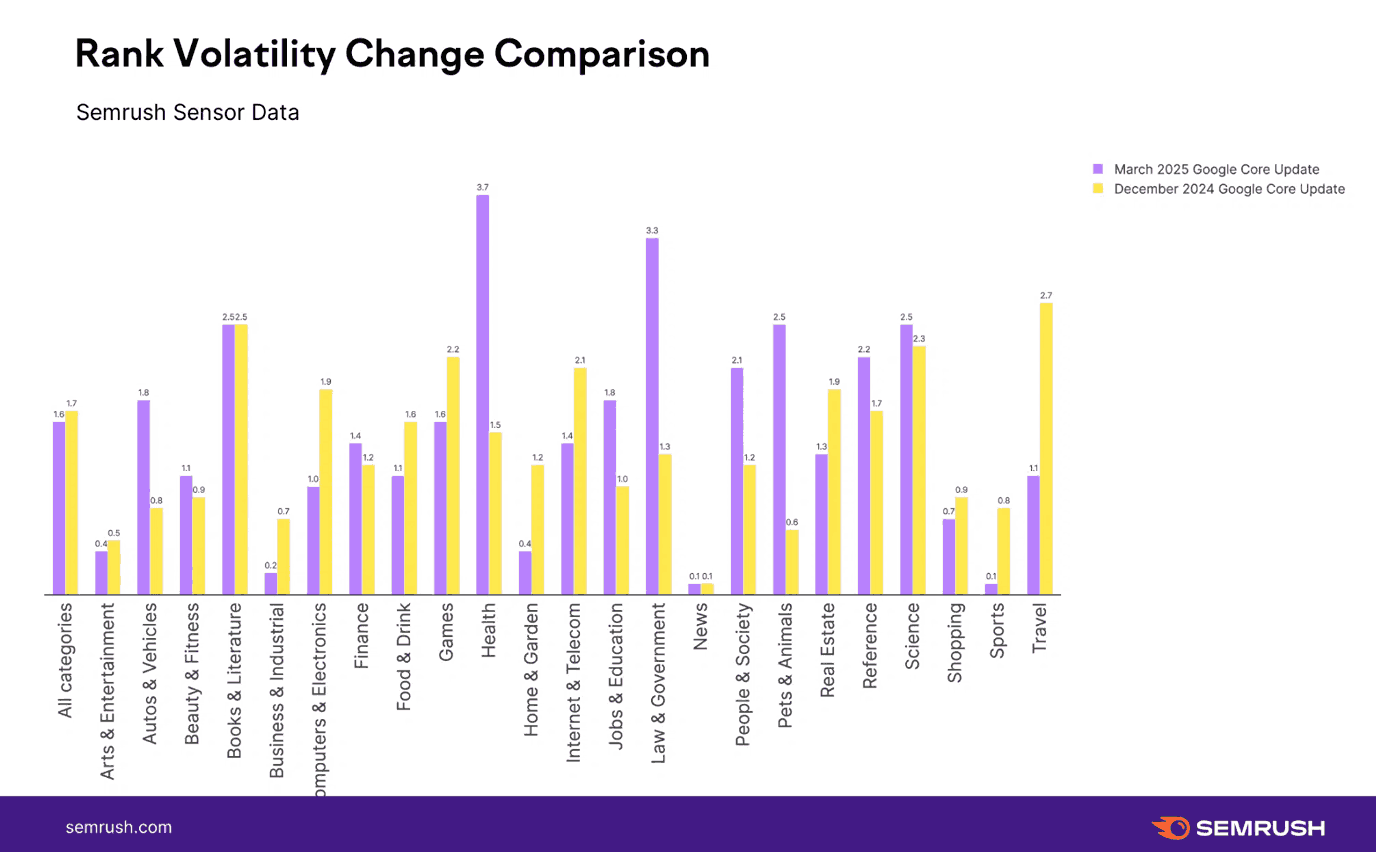
The graph shows ranking volatility from the March 2025 Core Update
(source: Search Engine Land)
So far in 2025, the March 2025 Core Update stands out as a key algorithmic change, causing notable shifts in website rankings. Industries like healthcare, education, finance, and media were particularly impacted, experiencing significant overnight rank fluctuations. This reinforces Google’s emphasis on high-quality, trustworthy information.
The March 2025 Core Update represents a “systems tweak” to how Google evaluates and ranks content. Google focused on:
- Content Quality and Useful Content Signals: Google penalizes poor content and AI, favoring human-centric content with real-world experience.
- EEAT: Google increasingly emphasizes EEAT (Experience, Expertise, Authoritativeness, Trustworthiness). Content must be expert-written/approved, authoritative, and up-to-date.
- Search Intent Match: Google’s goal is to meet user intent; content should directly answer the query’s intent.
- SERP SEO and Featured Snippets: Google favors snippets, “People Also Ask,” and Knowledge Panels; optimizing content structure is key.
- Reduce Spam and Reduce Link Profile Value: Google’s SpamBrain demotes sites with duplicate content, fake EEAT, or bad links. If you’re dealing with unwanted visibility, learn how to remove unwanted Google Search results.
When Is the Next Google Update in 2025?
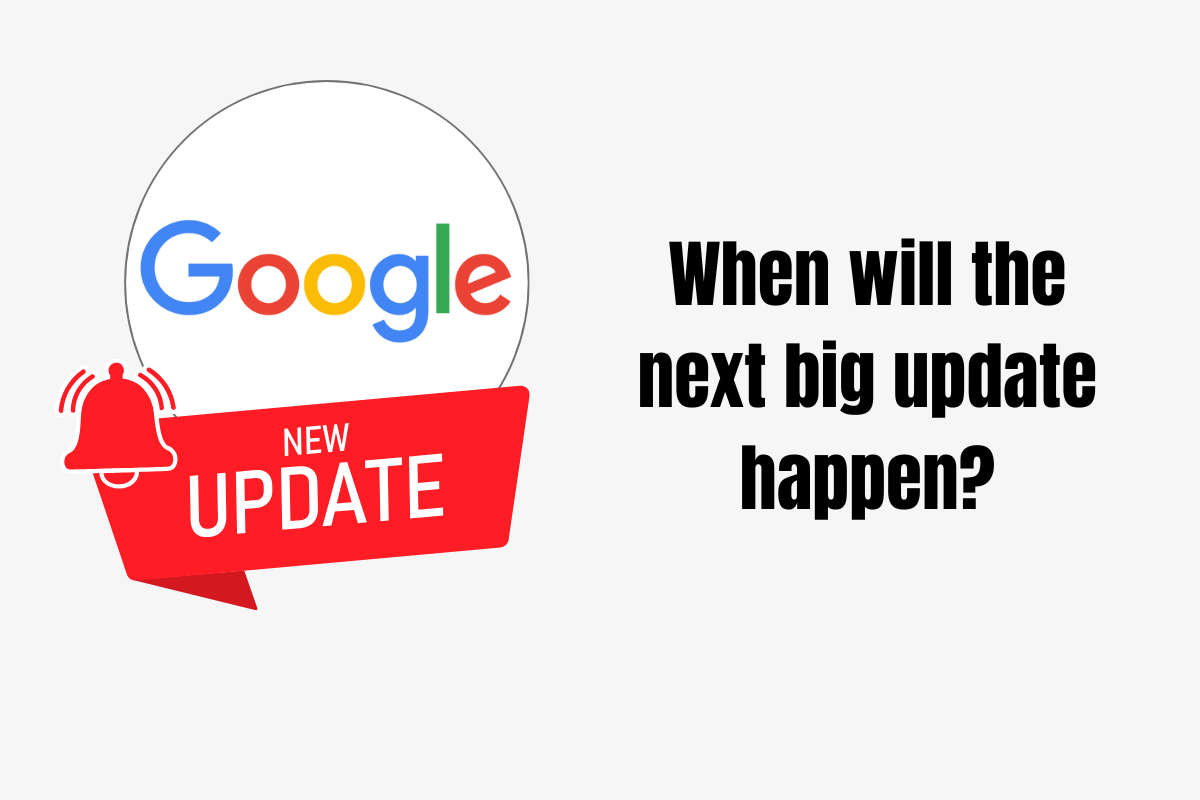
The next major update is around the corner
Based on past update patterns, we can make some guesses. Google often releases core updates every few months. This means we might see the next big update in August or September 2025. Several things can affect the Google update schedule 2025 include:
- Testing New Features: AI advancements or search innovations may trigger updates. This testing takes time and can affect release schedules.
- Changes in Ranking Focus: Google might shift its focus to new ranking factors based on user behavior or new technologies. This could lead to a new update.
- Feedback and Performance: Google refines algorithms based on search behavior (ROI Revolution). If they see problems, they might release an update to fix them.
- Spam Tactics: Unexpected events, like major spam surges, can also prompt updates.
To prepare for future updates, there are several things you can do:
- Follow Official Google Announcements: Google often shares information about core updates on its official Search Central Blog.
- Use SEO Tools to Track Performance: Tools like Google Analytics, Google Search Console, and other SEO platforms can help you see if your website’s performance changes. If you see a big drop or rise, it might be due to an update.
- Focus on High-Quality Content: Always aim to create content that is helpful, accurate, and original for your user-focused content aligned with EEAT.
- Improve User Experience (UX): Make sure your website is easy to use, loads fast, and looks good on all devices. You can optimize for mobile and Core Web Vitals.
You might want to read this article if you are struggling with SEO: 25 Proven SEO Techniques to Boost Your Rankings in 2025
How to Stay Updated on Google Algorithm Changes
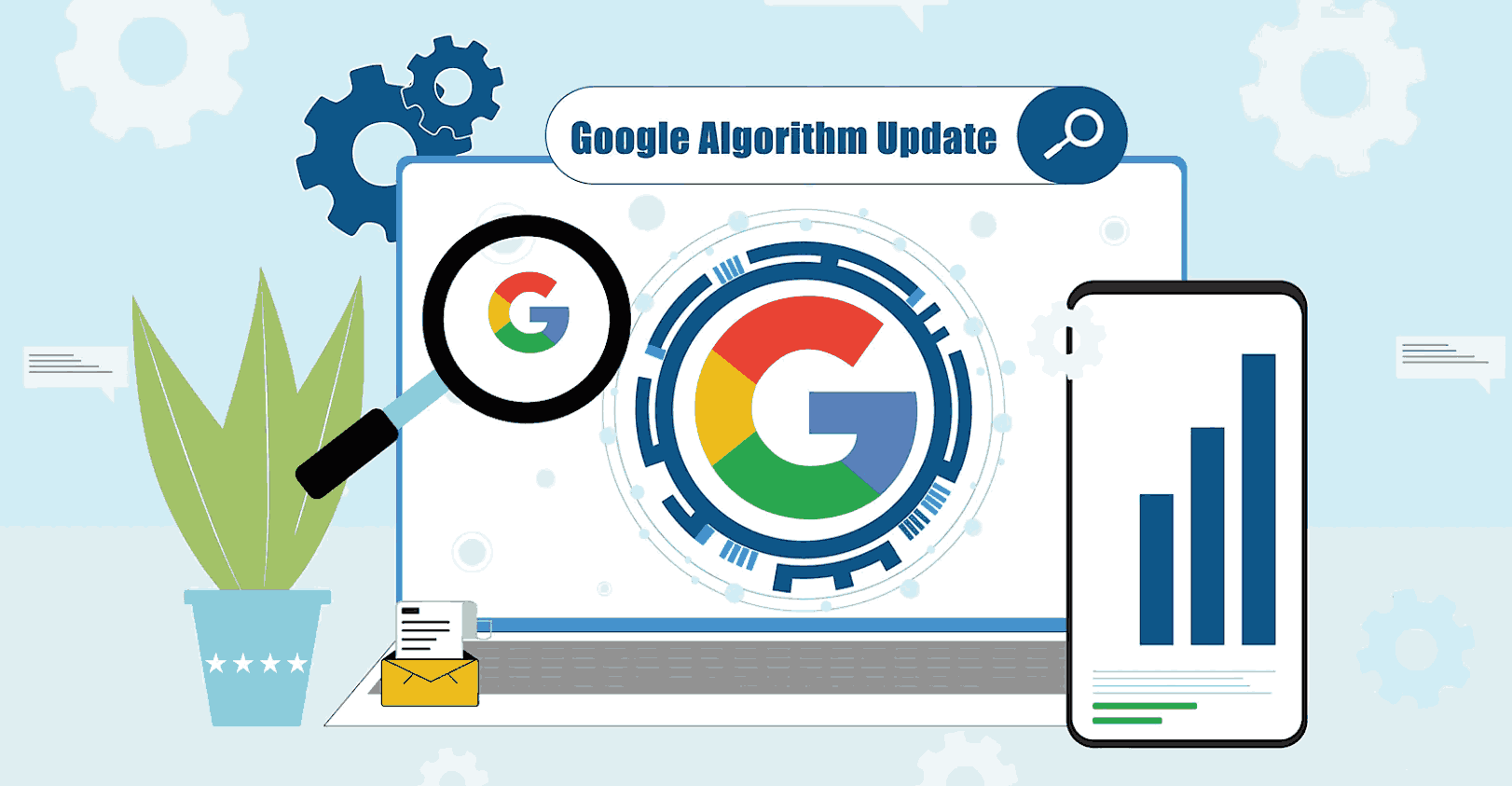
Google algorithm updates are crucial to maintaining and improving SEO
To stay ahead in the ever-changing world of SEO, staying on top of Google’s algorithm updates is crucial. These tweaks, whether small or large, can reshape your site’s position in search results.
Google regularly fine-tunes its algorithm to provide optimal search results. Although most of these adjustments pass by unnoticed, significant updates, like Panda, Penguin, or even the introduction of Google’s AI Overviews, can directly impact your website’s position in search engine results pages (SERPs).
Trust sources to follow
A comprehensive information strategy requires incorporating official Google sources. Having accurate announcements allows you to spot changes early and make changes faster. Relying on a single source is not enough in today’s SEO landscape.
Beyond official SEO channels like the Google Search Status Dashboard and Google Search Central Blog, Search Engine Journal offers expert analysis. Additionally, SEO communities like Reddit’s r/SEO and WebmasterWorld provide valuable real-time insights and discussions from professionals.
How to understand and apply Google updates
To effectively navigate Google’s algorithm changes, follow official announcements from Google Search Central and trusted SEO news channels. This will help you understand the core intent behind each update.
Then, adjust your SEO approach by prioritizing user-centric content, building EEAT, and ensuring your site provides relevant answers to search queries. Continuously testing your site against these updates will help you maintain and improve your search performance.
Set Up Google Alerts
You can easily track algorithm changes by setting up Google Alerts at www.google.com/alerts/. This tool lets you tailor notifications based on:
- Specific phrases or topics you want to follow.
- How frequently do you want to receive updates
- The sources you trust for information.
- The quality of the results you prefer.
The primary advantage of using Google Alerts is that the news is delivered directly to you, requiring no further action once your alert is active.
Follow Industry Leaders
The SEO community boasts numerous influential companies and individuals who are key sources of information. Some prominent figures to follow include Danny Sullivan (GoogleSearchLiaison), Barry Schwartz (RustyBrick), Marie Haynes (Marie_Haynes), Lily Ray (LilyRayNYC), and John Mueller (JohnMu).
Additionally, several notable newsletters and blogs consistently report on algorithm updates. These include Moz, Search Engine Land, Search Engine Roundtable, and Google Search Central Blog.
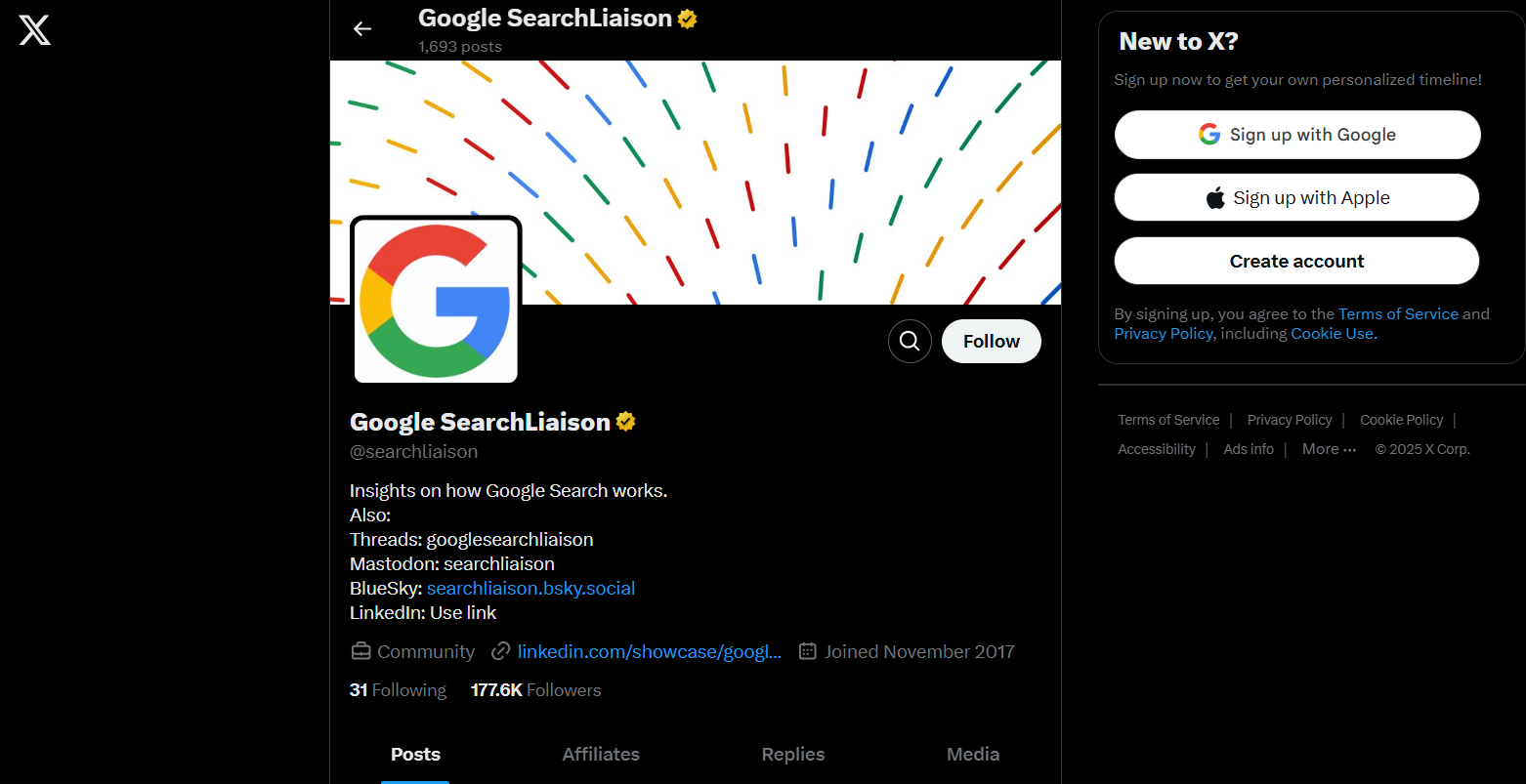
Danny Sullivan (GoogleSearchLiaison)
These experts and publications are known for their insights into tech SEO, making them reliable sources for major change announcements. Subscribing to their newsletters or email lists is an easy way to receive timely algorithm news.
Engage on X (Formerly Twitter)
X has become a highly relevant social media platform within the SEO world, serving as an excellent tool for tracking Google algorithms.
It’s recommended to follow key influencers, including those who work at Google, and specific hashtags like #GoogleUpdate and #GoogleAlgorithm. This can provide real-time updates and discussions as changes unfold.

Make sure to check what people are saying about the Google Updates
Monitor the Google Search Status Dashboard
Google now provides its own Search Status Dashboard, which helps you stay informed about updates to the systems powering Google Search. Their dedicated rankings dashboard is especially useful for keeping track of algorithm changes. This official resource can offer direct insights into known issues or announced updates.
Analyze Google Analytics Data
Webmasters should consistently monitor Google Analytics, Google’s tool for tracking website traffic and other performance metrics. This practice helps you understand your site’s typical traffic patterns and normal fluctuations. By knowing what “normal” looks like, significant changes in traffic and conversions will stand out.
Utilize Ranking Tools
Beyond official Google tools, various third-party ranking tools can also assist webmasters. While Google suggests these might sometimes provide inaccurate information, marketers often rely on specific tools to help them monitor algorithm shifts. Popular choices include Algoroo, SEMRush Sensor, and Mozcast.
Conclusion
Knowing “when is the next Google update in 2025” will help businesses stay competitive. While no update is confirmed post-March 2025, August or September is likely based on past trends.
Golden Owl Digital supports businesses in navigating these changes with expert SEO strategies. Stay proactive with high-quality content and monitoring tools to maintain rankings. Contact Golden Owl Digital for expert strategies on preparing for the Google SEO 2025 update and boosting your online presence.

Jaden is an SEO Specialist at Golden Owl Digital. He helps brands rank higher with technical SEO and content that resonates






